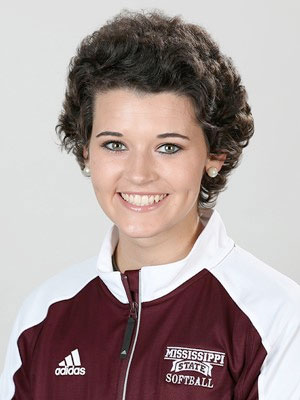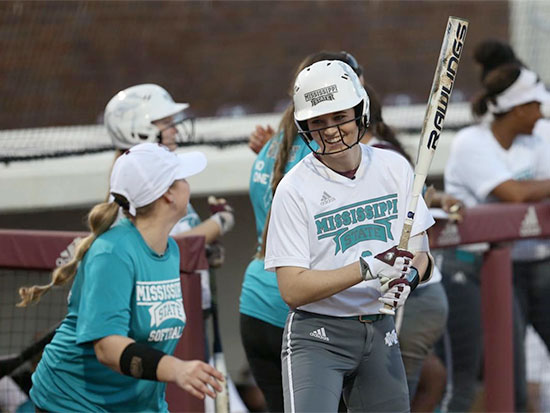 Mississippi State freshman outfielder Alex WilcoxWhen watching the Mississippi State softball team take the field this spring, it would be tough to tell that freshman outfielder Alex Wilcox is actively undergoing chemotherapy treatment. The 18-year-old Brantley, Alabama, native has been battling ovarian cancer since December 2015, juggling her Division I softball commitments and chemotherapy regimens at the University of Alabama at Birmingham with unmatched resiliency.
Mississippi State freshman outfielder Alex WilcoxWhen watching the Mississippi State softball team take the field this spring, it would be tough to tell that freshman outfielder Alex Wilcox is actively undergoing chemotherapy treatment. The 18-year-old Brantley, Alabama, native has been battling ovarian cancer since December 2015, juggling her Division I softball commitments and chemotherapy regimens at the University of Alabama at Birmingham with unmatched resiliency.
It started when Wilcox, a junior in high school at the time, felt abnormal pain in her side. She chalked it up to appendicitis; but after being rushed to the nearest emergency room, she and her family knew something was not right. Their suspicions were confirmed when the pain Wilcox was experiencing was diagnosed as ovarian cancer, specifically granulosa cell tumor of the ovary.
“You hear people say this, but you never think something like that will happen to you,” Wilcox said. “I had heard a lot about other cancers over my lifetime; but I didn’t know much about ovarian cancer at all, let alone that it could develop in girls my age.”
After she was referred to UAB’s Division of Gynecologic Oncology, Wilcox’s care and treatment plan began with a surgery to remove her tumor, and rounds of chemotherapy and surgeries to follow. All the while, Wilcox was still making strides on the softball field, inking her commitment to the Mississippi State softball team in fall of 2016 while in the throes of intense treatment.
Now, two years after her initial diagnosis, Wilcox is living out her dream by taking the field each week with the Bulldogs in Starkville. Her treatment has been personalized to enable her to compete if she is up to it, but her care team at UAB credits her ability to play to her unparalleled tenacity.
 The Mississippi State Bulldogs have donned teal uniforms all season in support of Wilcox, right, while raising awareness about ovarian cancer with their fans. “What Alex has gone through is nothing short of remarkable, and she is surrounded by teams both here at UAB and at Mississippi State that are working to keep her healthy and able to live out her dream of competing at the highest level,” said Warner K. Huh, M.D., director of UAB’s Division of Gynecology Oncology and Wilcox’s oncologist. “Her involvement as an athlete has given us tangible goals to meet, but her drive and spirit are really what have made the difference. I’ve never worked with a patient before who has the type of bravery and patience that Alex has.”
The Mississippi State Bulldogs have donned teal uniforms all season in support of Wilcox, right, while raising awareness about ovarian cancer with their fans. “What Alex has gone through is nothing short of remarkable, and she is surrounded by teams both here at UAB and at Mississippi State that are working to keep her healthy and able to live out her dream of competing at the highest level,” said Warner K. Huh, M.D., director of UAB’s Division of Gynecology Oncology and Wilcox’s oncologist. “Her involvement as an athlete has given us tangible goals to meet, but her drive and spirit are really what have made the difference. I’ve never worked with a patient before who has the type of bravery and patience that Alex has.”
While ovarian cancer tends to be uncommon in young women and teenagers, Wilcox’s particular cancer is incredibly rare.
According to the American Cancer Society, 22,240 women will be diagnosed with ovarian cancer in 2018. Ovarian cancer is often known as the “silent killer,” as many of its symptoms tend to be ones that women experience as nonspecific symptoms or with menstruation, but Huh wants women to understand that paying attention to their own bodies can be the best detector.
“Women may experience symptoms like bloating, cramping or nausea regularly; but it’s when it turns chronic that there is an indicator that something is not right. Women are the only ones who can judge their symptoms and know when they are experiencing a legitimate bodily change, so we encourage them to always speak up and seek clinical advice if something doesn’t appear right — it could be what saves their life.”
For Wilcox, going through her cancer at this phase in her life has not been easy; but having strong teams behind her has made all the difference. The softball team at Mississippi State has even launched a campaign in her honor appropriately titled “No One Fights Alone,” wearing special teal team jerseys each week to shed light on ovarian cancer and in support of her fight, a campaign that her care team at UAB have also rallied behind.
“Since day one of treatment, my care team at UAB has shot everything to me straight and outlined how we are going to work through this together, just as my teammates have supported me during this time on and off the field,” Wilcox said. “Whether I’ve been able to play or had to watch from the sidelines, all of my teams have made the difference and made me realize that I really am not fighting this alone.”
